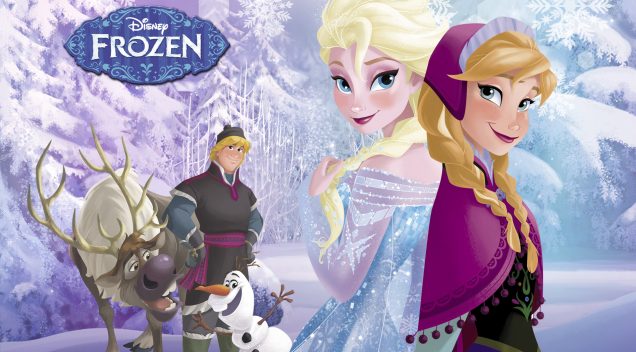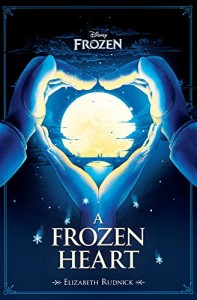Frozen: Plot Holes
So this post has technically been overdue for some time now. I promised a continuation of my first Frozen post but it’s been difficult to find time to do the research. Over the last month, I finally found time to do some prep work and I think I finally feel ready to post something.
One of these many prep work tasks was to read the recent novel based on Frozen, titled A Frozen Heart. I’m sure if push came to shove, it would be regarded as non-canon, but I would say it’s the next best thing to a continuing story that we could ask for. In the novel, we take a sophisticated look at events of Frozen, exploring Anna and Han’s backstories, motivations, and doomed relationship.
Starting with a short review of the book, I’d like to say… it was good! The parts that involved material not included in the movie were well written and in my opinion did not break the original story. The chapters alternated between Anna and Hans, which provided a better understanding to their characters throughout the story. I do however have one complaint; probably half the book is scenes repeated line for line from the movie. While this was tolerable, it only got worse as the end drew near. It wasn’t bad enough that I wouldn’t recommend the book, but there was so much more the author could have done had she explored more original material–or at least an original interpretation of the movie scenes.
That being said, there were a few excellent scenes. Most notable was the progression of Anna’s heart as it froze. I’ve lived most my life in Chicago and I can say a decent windchill on your face is really painful; give it long enough and your skin will hurt as it literally freezes and then recovers. I was imaging that feeling as I was reading the very descriptive process Anna was experiencing; it just made me hurt. I’d have to say it was the most painful piece of writing I’ve ever read.
Other scenes I’d note would include Hans’s relationship with his family and Anna’s regrets, but I won’t spoil too much.
So what is this post about? I want to address a few of the plot holes people commonly point out about the movie. A lot of people like to rail on the movie’s supposed weak links, and I want to debunk (or prove) some of them. Obviously, spoiler alert, I will be talking about the movie in-depth. But really, shame on you if you haven’t seen it yet!
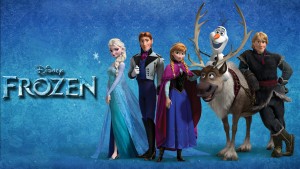
Disney’s Frozen
Why does the town accept (and forgive) Elsa so soon?
Let’s start with the easy pickings: Why did the kingdom accept and then forgive Elsa so soon? Well, let’s consider the scene where her powers were first revealed to the public. We know the kingdom adores her, even if they have only seen her in paintings or in passing at formal events. Suppose the Queen of England was one day revealed to have magical powers; the British are very loyal to their queen, so I don’t think they would immediately start calling for her head unless they blatantly witnessed her injuring people. Furthermore, the people did not have very much time to even fully grasp the situation; when Elsa shot a bolt of ice at the duke, I think people were only taking a step back out of surprise and caution. If they truly thought she was a monster, wouldn’t they be running from the castle in terror? Wouldn’t the kingdom have descended into chaos after she ran away and Anna took after her? I believe the kingdom had too much trust in their queen to immediately distrust her. Once they had Princess Anna, another beloved member of the Royal Family, show her trust for Elsa, I think things went over better than anyone would have expected.
And as for forgiveness, what was there to forgive? Yeah, she froze the land and put the kingdom though a rough patch, but she never directly injured or insulted them. And for those closer to her, like many of the dignitaries, I believe they came around even quicker once they had a shared enemy to dislike. Again, I don’t feel that this is really that huge of a plot hole for the movie. Speaking in terms of real life, how many times have people like Elsa feared that they could never be forgiven, and yet their family and friends came together to support them? Maybe the kingdom forgiving and accepting her so quickly serves as an example that sometimes people can surprise us.
Where do Elsa’s powers come from?
So I will admit, this is a pretty good question. Where did Elsa get her powers? Her father, Agar, says she was born with it. Now we can assume that being cursed with the powers has also happened, since the troll had to ask to clarify, which makes one wonder if ice powers had been seen in this kingdom before. Well, let’s start by examining the original story the movie is based on, The Snow Queen, written by Hans Christian Andersen and first published in 1844. The book starts by telling the story of “the devil” who attempts to take an magic troll mirror that distorts the appearance of everything into the heavens, intending to use it to make fools of God and his angels. The mirror slips from his grasp and falls to earth, shattering into billions of pieces; carried by the wind, these shards find their way into the hearts and eyes of people, freezing their hearts and making their eyes like the troll-mirror itself. Years later a boy named Kai is cursed with some of these shards; they make him cruel and aggressive, which destroys his relationship with Gerda, who is the inspiration for Princess Anna.
According to the creators of Frozen, they had a long and somewhat winded explanation to where Elsa’s powers came from. Sadly this was all cut for time and continuity, but the demo song “Life’s Too Short” was released in the deluxe edition of the soundtrack. This song was later replaced with “For the First Time in Forever (Reprise),” and it contains several nuggets of information about the original backstory. From that song we learn that there is some sort of prophecy; Anna quite literally says, “I’m the only one who is not 100% convinced the prophecy is you!” She later, in a fit of passion, suggests that perhaps Elsa is “the prophecy,” causing Elsa to react in anger and accidentally freeze Anna’s heart. We can therefore assume that Elsa and the kingdom has been aware of the prophecy, and perhaps when Elsa’s powers were revealed, there were rumors that she was the fulfillment.
The prophecy itself was revealed in another deleted song:
Your future is bleak
Your kingdom will splinter
Your land shall be cursed
With unending winter
With blasts of cold will come dark art,
And a ruler with a frozen heart!
Then all will perish in snow and ice!
Unless you are freed with a sword sacrifice!
Unfortunately this prophecy does not provide very much explanation to why Elsa has powers; it only states that, assuming Elsa is the prophecy, she will have a frozen heart and that her magic is actually of the dark arts. Sadly, this sounds more like the original story by H.C. Andersen and, as we know, Frozen has changed much from the original tale. As the troll said, her magic has beauty but she must learn to control it or it will become her enemy.
While the “prophecy” plot seems to have been disbanded, another hint did make it into the movie: the book that Elsa’s father references in the beginning of the movie. The ancient book is written in Old Norse Runic, which is the language of the Scandinavians during the Viking Age. The Viking Age is the period from A.D. 793–1066; considering the approximate date in which Frozen takes place, this means the curse and its related lore has been around for over 700 years.
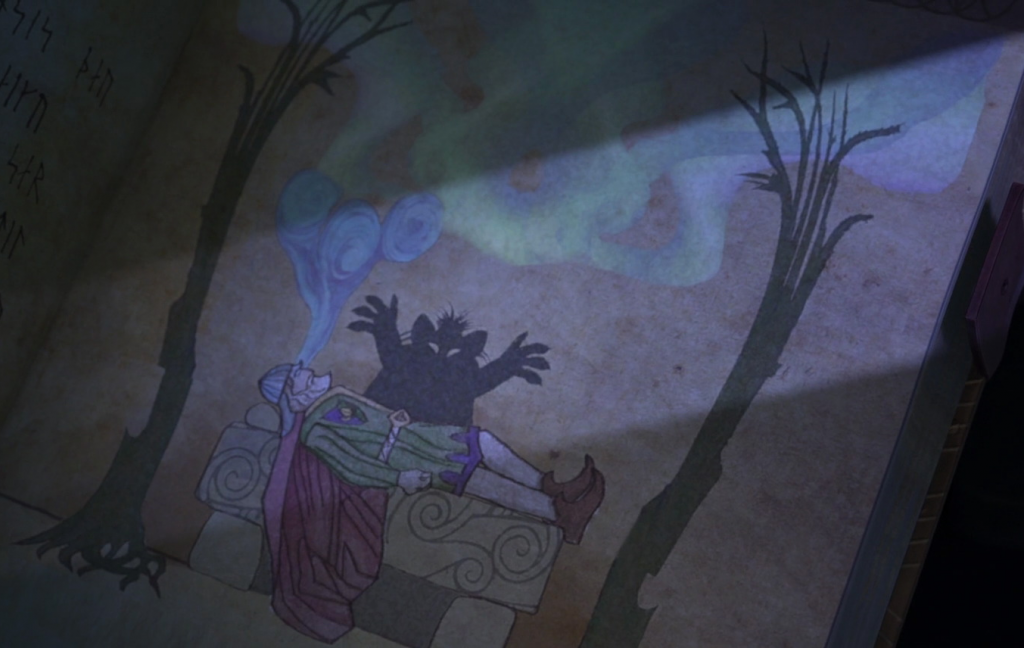
The title of the book, as shown in the first shot, can be roughly translated to “Runes of Known Magic.” As for the text shown on the inside of the book, I want to thank Panya’s Blog for providing a thorough translation. Here is what I believe the text is saying: “Cursed by the ice sorcery brought forth by the powers of the full moon. The Trolls from the dark mountain realm, who have hands to heal. A soul which was wounded by cold will heal, if brought very quickly to the valley of the Trolls. The Trolls have the ability to remove all ice sorcery from the body, but only an act of true love will thaw a frozen heart.” I suggest you go read the original translation as mine is heavily edited to make more sense.
Deciphering the Runes Book in Disney’s Frozen
As we can see from the translation and the illustration in the book, a man has been cursed with ice sorcery brought forth by the full moon. I say “cursed” because this would be why Grand Pappy asked if Elsa was born with it or cursed. I will go off on a limb and say that one can be born with this “ice sorcery” if they are a descendant of an ancestor who was also cursed with it. I’m going to assume this ice sorcery is taken from the evil troll mirror that fell to earth in H.C. Andersen’s original story. While this isn’t a complete backstory, it does give us a good idea where Elsa’s powers come from.
Real quickly, I want to note that Elsa’s father obviously knew how to read the runes. It actually appears that this language is still in use in Arendelle at the time of the movie. We see Old Norse Runic written on the King and Queen’s grave stones, and we also see it on the cover of books used by the Bishop during Elsa’s coronation and the Trolls while they were trying to marry Anna and Kristoff.
How did Hans expect to take the throne, since royal succession does not work like that?
I’m going to assume that if you’ve read or watched any material on Frozen plot holes, this one would likely be near the top. While I agree that Hans’s plan was far fetched, I feel it actually could have been possible. Why do I think this? Well, let’s look at the official laws of Arendelle… Wait, Arendelle is a fictional kingdom. Well, since we know Arendelle is based on the Norwegian town of Arendal, let’s look at Norway’s government. Norway as of today is a constitutional monarchy, established in their 1814 Constitution; this means that power is divided between the Parliament, the King, and the Supreme Court. While this may not be the type of government we see in Frozen, it still gives us an idea of what Hans would have needed to successfully supersede as King of Arendelle.
So let’s start with the elephant in the kingdom; Hans, as everyone has tried to say many times, can’t take the throne from Anna and Elsa simply by axing them off (not to be morbid or anything). Well… they might be wrong there. Britain also has a Parliament, and according their Bill of Rights (1689) and Act of Settlement (1701), Parliament can regulate succession to anyone they see fit, as long as the sovereign be in communion with the Church, swear to preserve the established Church, and uphold the Protestant succession. While Norway is not England, it is stated in the Norwegian constitution that if the current monarch has no suitable heirs, a council of sixty representatives can select whoever they thought would better “…guard God’s right and the laws of the land…”
So what does this mean for Hans? Well, it means that if the Parliament, assuming Arendelle has one of sorts, could appoint Hans as King if they determined the throne was vacant. There was obviously some kind of council or acting ruler running the kingdom in the three years between when Elsa’s parents died and Elsa’s coronation. We also see the passel of dignitaries following Anna’s (and then Hans’s) commands almost without question, so I do not think Hans would have had a hard time manipulating them if it came to that.
And lastly let’s just consider that Anna did make the last second decision to run for Kristoff instead of Elsa and froze. Elsa would be dead in cold blood (no pun intended) and, as far as the dignitaries of Arendelle know, Hans said his wedding vows with Anna. While they might have questions, they would still consider him to be the king/prince consort. While this does not make him king automatically, he would have more leverage with the council. But thankfully he was not successful and we will never know. All I can say is I’m at least more forgiving of this plot hole now that I know he might have had a minor, very minor chance of taking the throne legally.
References:
https://en.wikipedia.org/wiki/Norwegian_Law_of_Succession
http://www.royal.gov.uk/ThecurrentRoyalFamily/Successionandprecedence/Succession/Overview.aspx
Other Plot Holes
Why did the town applaud when Anna punched Hans, seeing they had no idea Hans was evil?
When I first saw this one come across the table, I immediately agreed. It was quite odd that immediately after Elsa has ended the winter, Anna gave Hans a nice hefty punch in the face–which I’d love to talk more about Anna’s no-fear complex sometime in the near future–and the dignitaries are seen standing on a balcony applauding her actions, whereas they had supported Hans moments before. I would assume the dignitaries were able of clearly seeing over the entire fjord from the balcony, which might mean they saw more of the final battle. But even more importantly, their first thought was probably “Princess Anna is alive!” That right there is enough for them to realize something is up, and they are going to immediately side with their princess and follow her lead. Secondly, wouldn’t you also applaud a woman for punching a man? Society doesn’t tend to ask questions when women defend themselves against men.
Elsa never left her room?
Honestly, yes and no. We have some evidence to show that she did leave her room from time to time. Early on we see Anna seeing Elsa come and go from her room, and when the king and queen leave for their trip, she’s saying goodbye at the bottom of the steps–obviously outside of her room. Later Elsa appears to move into the official king’s chambers, as shown while she’s preparing for the coronation. After her parents died, I’m sure she withdrew even more in her grief, but that doesn’t mean she never left. It’s more a figure of speech. Many times people follow this plot hole up with, the question, “What did she do in there?” Frankly, I believe is a result of people having way too much to do these days. They did not have the Internet or any technology to keep them occupied back then, and I think this leads to people thinking they had nothing to do. I have friends that can sit for hours a day just reading or knitting, so I don’t doubt her ability to find activities. Plus she, like Anna, had royal lessons to learn during her teens.
Why did the king and queen lock her up, and why didn’t they seek help?
From whom, I ask, should they have sought help? I can assume the king is the only one who has any idea what’s going on. Also I bet the queen married from outside the kingdom and is possibly a sister to Rapunzel’s mother as people have suggested, hence why the king and queen would sail to Rapunzel’s kingdom for the royal wedding. We know that the king and queen talked with the trolls in the opening, but like many parents, they usually don’t know that they are making a mistake until it’s far too late to change it. Such is the risk of parenting when you’re dealing with such an unusual and stressful circumstance. Sadly they died at sea and they will never learn what became of their daughters.
Parents die and then nobody takes care of the sisters for the next couple of years?
This is actually not true. Both Anna and Elsa were taken care of by their royal servants. We also have Kai–not Kai from the The Snow Queen but instead a servant of the Royal House. We are told in the book that he has known the family for a long time. The castle might have a limited staff but this does not mean there was no one to care for them. As for who ran the kingdom, Elsa was unofficially made queen when her parents died, although it wasn’t until the age of 21 that she is officially crowned. Depending on the laws of the kingdom, she may have ruled directly, or a council may have ruled by proxy until she was of age.
Why did Anna never leave the castle on her own?
Okay, so I admit, this one sort of baffles me too. We can only suppose that her parents kept her indoors to keep the family’s affairs private, although that isn’t entirely fair to her. While it is technically said that Anna “never left” the castle until Elsa’s coronation, that’s not completely true.
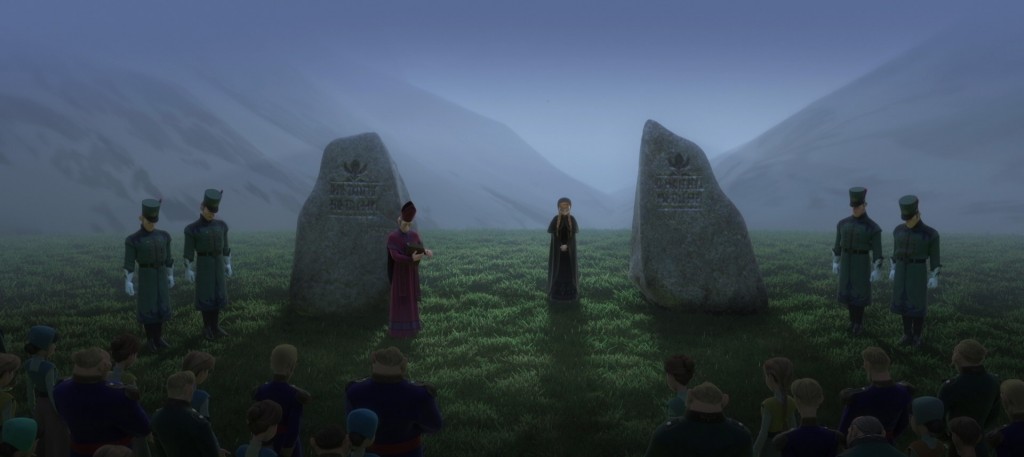
As you can see from this picture of the king and queen’s graves, Anna left the castle. Any trips outside the castle were probably accompanied, but that is normal for royalty. While it was minor, she did leave and had the opportunity to do things like learn to ride a horse. She might have been disallowed from having direct contact with people within the village. But like my point about who ran the kingdom before Elsa was officially queen, I bet her parents had rules set, like keeping the gates closed, and family servants such as Kai made sure to follow those guidelines. This is why the king and queen would have close servants to run things while they were absent.
And there you have it, my opinion on Frozen’s most popular “plot holes.” I find the story of Frozen a very tragic one, like most of Hans Christian Andersen’s writings. But I feel like the true victim of Frozen is Anna. Anna’s journey is very sad, as she is not only rejected and frozen alive, but she is also forced to live a life of solitude. Elsa might be the one who needed to learn how to get over her fears, but Anna was the one who suffered, to the point that she begged for forgiveness for her desire to simply be reunited with her sister, as said in the book. Frozen is an amazing story and I hope it will become a classic much like the original, but I guess only time will tell. Frozen has tugged on our hearts as it tells a very deep, emotional story. It’s not just a kids’ movie; it’s also a very adult story dealing with death, fear, and grief. In many places of the story, I believe it’s too deep for people to even fully comprehend the tragedy, which is why some people seem to lose sight of the true meaning and instead trip over the plot holes they want to see.

